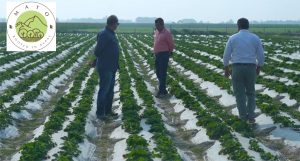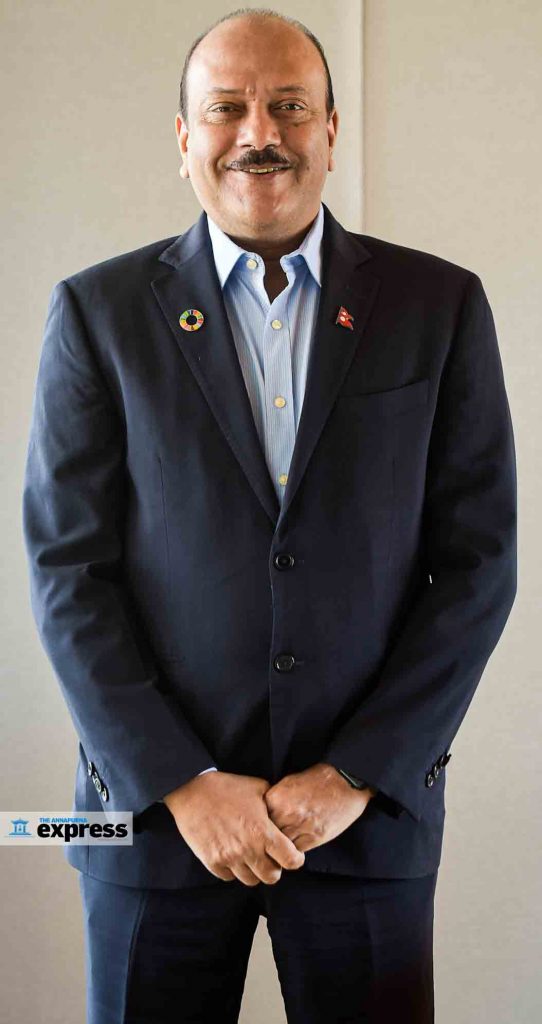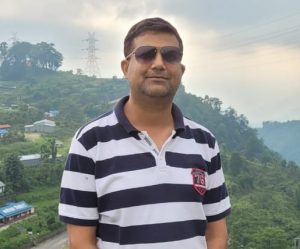Graduated from Mahendra Morang Campus, Morang
Got involved in organic agriculture as a part of CSR in 2017
Husband of Surabhi Golyan
Father to Jaya Golyan and Akshay Golyan
 I started limiting my involvement in my businesses after I reached 50. And at 60 I was a retired man, unsure of what to do with my free time. I had always wanted to share my experience and knowledge with youths, so I began attending youth-centered seminars and workshops.
My other interest was agriculture. Two-thirds of Nepalis rely on agriculture and yet, it is the most ignored field. So I wanted to assist our farmers and help the agriculture industry. As a part of corporate social responsibility (CSR) of the Golyan Group, I started a program in 2017 that taught organic farming practice in a small village of Jhapa.
Widespread use of pesticides in modern farming culture is harming both farmers and consumers. Many farmers don’t know how to safely use pesticides, which has the potential of causing various diseases including cancer.
For consumers, too, agro products grown with pesticides are harmful. In Kathmandu, there are very few people in their 30s who have no health complications. This, I believe, is due to the food they eat.
With the organic farming program, my aim was not just limited to helping farmers grow healthy food products but also reduce our import reliance on agro products.
In a short time, the project was expanded to 25 villages in eastern Nepal and it engaged 1,000 farmers. But there was one problem. Despite good production, the organic products could not find a proper market. The farmers were also not getting the right price for their produce, as our reliance on imported agro products remained unchanged. Imported products were preferred over domestic ones.
There was a need to directly connect our farmers to consumers. For this, Mato was established in 2018. The company promotes organic preservative-free products grown by local farmers. The brand represents earth, nature and purity.
Mato products are one hundred percent organic, born out of an empowering vision to collaborate with farmers and discover the exciting potential of Nepal’s agricultural diversity. The company helps local farmers with packaging and branding so that they can run a sustainable agriculture business.
Under Mato, we bought 354,034 square meters of land and started contract farming. Before finalizing any products, we carry out a thorough research and try to grow those crops that complement farmers.
[caption id="attachment_32786" align="alignnone" width="300"]
I started limiting my involvement in my businesses after I reached 50. And at 60 I was a retired man, unsure of what to do with my free time. I had always wanted to share my experience and knowledge with youths, so I began attending youth-centered seminars and workshops.
My other interest was agriculture. Two-thirds of Nepalis rely on agriculture and yet, it is the most ignored field. So I wanted to assist our farmers and help the agriculture industry. As a part of corporate social responsibility (CSR) of the Golyan Group, I started a program in 2017 that taught organic farming practice in a small village of Jhapa.
Widespread use of pesticides in modern farming culture is harming both farmers and consumers. Many farmers don’t know how to safely use pesticides, which has the potential of causing various diseases including cancer.
For consumers, too, agro products grown with pesticides are harmful. In Kathmandu, there are very few people in their 30s who have no health complications. This, I believe, is due to the food they eat.
With the organic farming program, my aim was not just limited to helping farmers grow healthy food products but also reduce our import reliance on agro products.
In a short time, the project was expanded to 25 villages in eastern Nepal and it engaged 1,000 farmers. But there was one problem. Despite good production, the organic products could not find a proper market. The farmers were also not getting the right price for their produce, as our reliance on imported agro products remained unchanged. Imported products were preferred over domestic ones.
There was a need to directly connect our farmers to consumers. For this, Mato was established in 2018. The company promotes organic preservative-free products grown by local farmers. The brand represents earth, nature and purity.
Mato products are one hundred percent organic, born out of an empowering vision to collaborate with farmers and discover the exciting potential of Nepal’s agricultural diversity. The company helps local farmers with packaging and branding so that they can run a sustainable agriculture business.
Under Mato, we bought 354,034 square meters of land and started contract farming. Before finalizing any products, we carry out a thorough research and try to grow those crops that complement farmers.
[caption id="attachment_32786" align="alignnone" width="300"] Pawan Golyan (left) and team at Jhapa for the farm visit of organically produced strawberries grown by the local communities | Photo: Mato[/caption]
Our plan to buy an additional 505,763 square meters of land, which was halted due to the Covid-19 pandemic, is also finally moving ahead. Over the years, Mato has reached all seven provinces and currently produces 122 organic products. We are helping local farmers grow organic products and give them the market.
A farmer from Kathmandu had a small business in ghee production. He ran his operation from his home with limited equipment. Earlier, he used to produce around five kilograms of ghee per day. With Mato’s support, he was able to turn his business into a cottage industry. We helped him get a license from the Department of Food Technology and Quality Control (DFTQC), as well as concessional loans to increase his production.
Obtaining the DFTQC license and concessional loans can be a hectic process for ordinary farmers. So, Mato is there to help out farmers in every step. This is just a representative example of one farmer. We have been doing the same with so many farmers across the country.
Mato also advocates for food safety. These days, we barely find a food product that is healthy. Food items are plied with preservatives and kept in cold storage for a long time before they reach the market and by that time, they have lost both their taste and nutritional values.
Take honey for example. Most of the honey brands sold in the market have almost 30 to 40 percent of sugar, which acts as a preservative. Is it safe for consumers to eat this much sugar?
I believe that people need food literacy. Most of us buy our fruits, vegetables and other food items based on their appearance and packaging. We don’t think about their quality. We must do our research before buying any agro products. This will not only promote the health of consumers but also reduce and replace imported agro products.
For agriculture, there is a wheel with a set of must-do things. We have almost completed the wheel and we are now putting that wheel on the right track. As soon as we start rolling, we will have sustainable agro-processing.
I have been continuously lobbying for effective policies for Nepali agriculture and farmers. I have participated in many ministerial programs and shared my experience working in this field. For a farmer, soil testing, advanced quality seeds, irrigation, equipment and compost fertilizer are the basic needs. Not only the government, the private sector too should help farmers with their basic needs.
As one of the first start-ups established to assist farmers, Mato has always advocated for policies aimed at reducing or import reliance. We possess the capacity to feed the country, but our over-reliance on imports have put our farmers and their products in the shadows.
Pawan Golyan (left) and team at Jhapa for the farm visit of organically produced strawberries grown by the local communities | Photo: Mato[/caption]
Our plan to buy an additional 505,763 square meters of land, which was halted due to the Covid-19 pandemic, is also finally moving ahead. Over the years, Mato has reached all seven provinces and currently produces 122 organic products. We are helping local farmers grow organic products and give them the market.
A farmer from Kathmandu had a small business in ghee production. He ran his operation from his home with limited equipment. Earlier, he used to produce around five kilograms of ghee per day. With Mato’s support, he was able to turn his business into a cottage industry. We helped him get a license from the Department of Food Technology and Quality Control (DFTQC), as well as concessional loans to increase his production.
Obtaining the DFTQC license and concessional loans can be a hectic process for ordinary farmers. So, Mato is there to help out farmers in every step. This is just a representative example of one farmer. We have been doing the same with so many farmers across the country.
Mato also advocates for food safety. These days, we barely find a food product that is healthy. Food items are plied with preservatives and kept in cold storage for a long time before they reach the market and by that time, they have lost both their taste and nutritional values.
Take honey for example. Most of the honey brands sold in the market have almost 30 to 40 percent of sugar, which acts as a preservative. Is it safe for consumers to eat this much sugar?
I believe that people need food literacy. Most of us buy our fruits, vegetables and other food items based on their appearance and packaging. We don’t think about their quality. We must do our research before buying any agro products. This will not only promote the health of consumers but also reduce and replace imported agro products.
For agriculture, there is a wheel with a set of must-do things. We have almost completed the wheel and we are now putting that wheel on the right track. As soon as we start rolling, we will have sustainable agro-processing.
I have been continuously lobbying for effective policies for Nepali agriculture and farmers. I have participated in many ministerial programs and shared my experience working in this field. For a farmer, soil testing, advanced quality seeds, irrigation, equipment and compost fertilizer are the basic needs. Not only the government, the private sector too should help farmers with their basic needs.
As one of the first start-ups established to assist farmers, Mato has always advocated for policies aimed at reducing or import reliance. We possess the capacity to feed the country, but our over-reliance on imports have put our farmers and their products in the shadows.
 About him
Jaya Golyan (Daughter)
About him
Jaya Golyan (Daughter)
 My father has always been a person of few words, but he is an epitome of values. His greatest values are hardworking, resilience, vision and dedication. I grew up seeing him live with these values. He wakes up everyday with the same passion and dedication for his work. I have never seen him complain. My father has a vision for Nepal and he is going to make that come true.
Mahesh Pokharel (Colleague)
My father has always been a person of few words, but he is an epitome of values. His greatest values are hardworking, resilience, vision and dedication. I grew up seeing him live with these values. He wakes up everyday with the same passion and dedication for his work. I have never seen him complain. My father has a vision for Nepal and he is going to make that come true.
Mahesh Pokharel (Colleague)
 I have been working with Pawan sir for the past two decades. He is a philanthropist more than a businessperson. His concerns over CSR (especially in agriculture) always amaze me. Apart from that, he is among the very few employers who cares about and advocates for his employees. With his leadership, we have been able to make our workplace inclusive as our company, Reliance Spinning Mills, has over 1,500 women and people from the marginalized community. He also stopped the trend of hiring foreign employees and trained Nepali workers and hired them instead.
Charles Mendies (Friend)
I have been working with Pawan sir for the past two decades. He is a philanthropist more than a businessperson. His concerns over CSR (especially in agriculture) always amaze me. Apart from that, he is among the very few employers who cares about and advocates for his employees. With his leadership, we have been able to make our workplace inclusive as our company, Reliance Spinning Mills, has over 1,500 women and people from the marginalized community. He also stopped the trend of hiring foreign employees and trained Nepali workers and hired them instead.
Charles Mendies (Friend)
 Pawan is one of my closest friends, who has always been there for me during my highs and lows. Aside from his friendship, I admire his love for the country. He is a true patriot. He has always taught his family members, friends and colleagues to contribute for the better of the country. He believes that God has blessed Nepal with everything and it is up to us to pour our love and dedication to the country.
Pawan is one of my closest friends, who has always been there for me during my highs and lows. Aside from his friendship, I admire his love for the country. He is a true patriot. He has always taught his family members, friends and colleagues to contribute for the better of the country. He believes that God has blessed Nepal with everything and it is up to us to pour our love and dedication to the country.











